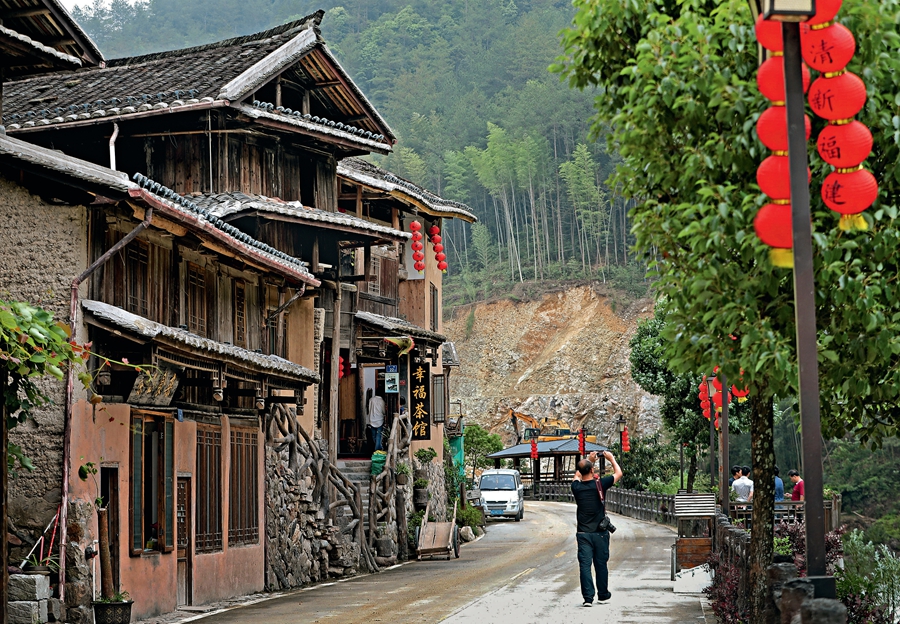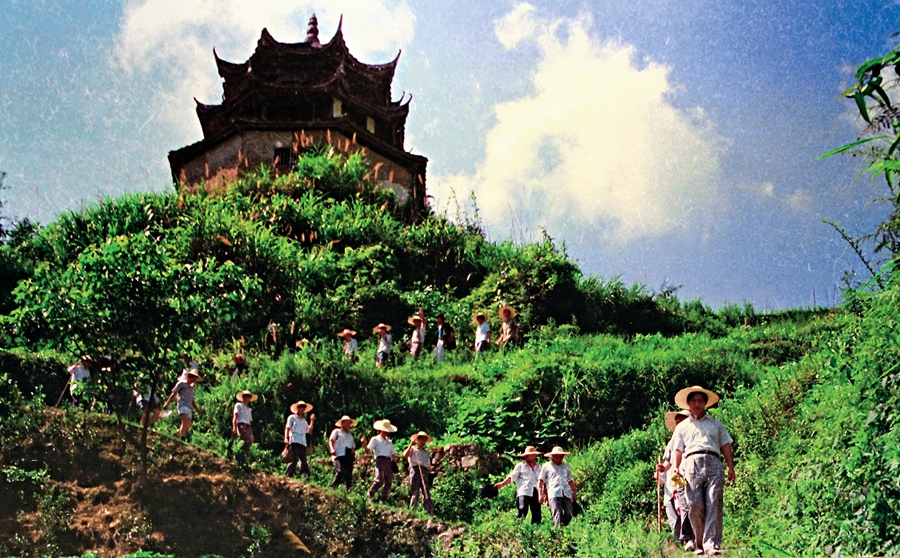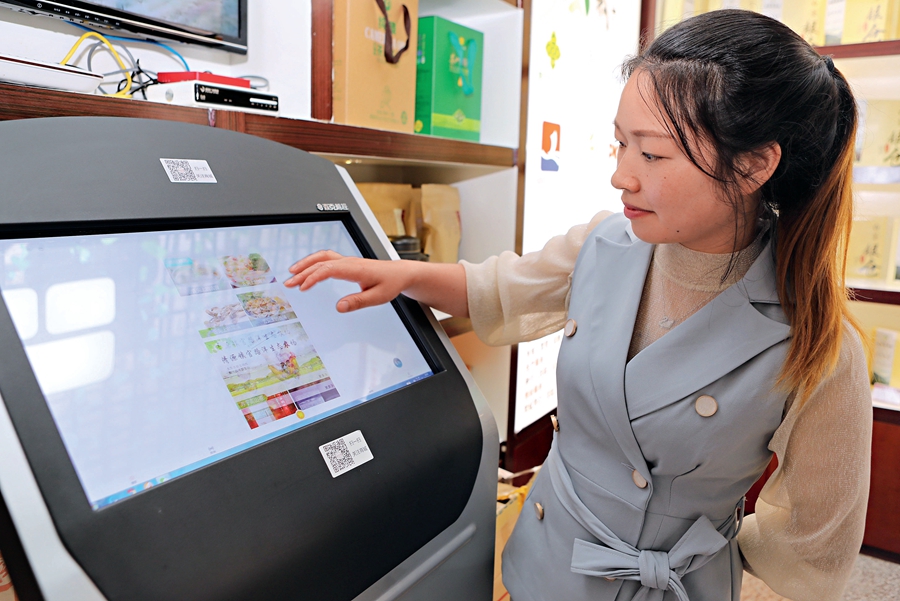XI Jinping came to Xiadang Village for the first time on July 19, 1989. At that time the village had no highway. When he arrived after hiking over hills and dales, sweat trickled down his forehead. Several villagers and I were surprised and welcomed him and delivered him a cup of tea,” said 71-year-old villager Wang Guangchao, who still remembers that year Xi, then secretary of the CPC Ningde Prefectural Committee of Fujian Province, surveyed and worked on the spot in the village regardless of the intense heat of summer.
Many years later, General Secretary Xi still remembers the tea that was offered by the villagers. A refreshing cup of tea to relieve summer heat became the lingering taste of Xiadang Village in his memory.

Picturesque Xiadang Village is alluring for tourists.
Located in the northwest of Shouning County of Ningde, Xiadang Village is 43 kilometers from the county seat. There are 1,341 villagers in 309 households in the village, which used to be the area for an old revolutionary base. Before 2014, the per capita annual income of the villagers was only RMB 4,200, and the village’s fiscal revenue was zero.
In recent years, villagers kept in mind Xi’s ardent assertion that “The development of the village depends on doing practical work rather than making empty talk.” Now, the village has developed a tea industry in accordance with local conditions, exploring a new model by establishing “customized tea gardens” for poverty alleviation.
“The Village I Can Never Forget in My Life”
“With an earnest desire to foster change, General Secretary Xi visited the poor in the village three times when he worked in Fujian. Every time he arrived, he gave great encouragement to local government officials and the people.” Liu Minghua, former deputy secretary of the CPC Xiadang Township Committee, clearly remembered the details of Xi’s three visits.
On July 19, 1989, Xi came to Xiadang for the first time. At that time, there was no highway. He tramped over hills and dales, worked on the spot, visited and offered consolation to people in challenging circumstances.
On July 26, 1989, only seven days later, Xi came to the village again. At that time, the village had just flooded due to heavy rainfall. He walked three kilometers in spite of the rain and went deep into the disaster-hit area to personally check the situation, and deployed the reconstruction work after the disaster. He told everyone to be strong, and his encouragement warmed the hearts of local people.
On August 7, 1996, seven years later, Xi, then deputy secretary of the Fujian Provincial Party Committee, came to Xiadang for the third time accompanied by the department heads of provincial transportation, finance, civil affairs, and poverty alleviation. “If the poverty problem can’t be solved, I feel ashamed to meet the fellow countrymen in Xiadang!” The powerful words made locals feel Xi’s sense of responsibility and deep concern for the people.
“Now more than 20 years have passed, serving as the top leader of the Party and the country, Xi still cares about Xiadang and remembers local people. He repeatedly recalled that ‘difficult and unforgettable’ past on different important occasions,” Liu Minghua said that the general secretary and Xiadang have an inextricable connection.
“Xiadang is a place that I have never forgotten,” Xi spoke of the village engraved in his memory. Local government officials and people remembered Xi’s help, concern, and encouragement as well.
Innovating the Tea Planting Model to Reduce Poverty
For many years, growing tea, picking tea-leaves, and selling tea have been the main source of income for locals. However, it is difficult to create their brands by scattered business models. The income of the local people remained low. The tea industry in Xiadang Village did not boom. Wang Mingzu, secretary of the village Party branch, felt huge pressure.

On July 19, 1989, Xi Jinping, then Secretary of the CPC Ningde Prefectural Committee, took a five-hour car drive and walked four and a half hours to Xiadang to conduct a field investigation. Photo courtesy of Xiadang Village
In 2014, the development of tea industry ushered in a new turning point. “With the assistance of the Organization Department of the Provincial Party Committee and the support of the Fujian Broadcast & TV Network Group, and with the help of the governments at city and county levels, China’s first poverty-reduction oriented tea garden was launched in Xiadang Village. The scattered individual tea growers were integrated and organized to plant teas on a 40-hectare plantation. Local companies and entrepreneurs are encouraged to sign five-year subscription agreements with the tea garden for RMB 20,000 per mu (15 mu=1 hectare). With the help of digital connectivity provided by the Internet, they established a traceability system for products ranging from tea in gardens to tea in cups and promoted the similar model in growing grapes and navel oranges, as well as other agricultural products. Prior to this, this development model was unattainable to Wang Mingzu and local villagers.
In August 2014, the village established Mengzhixiang Agricultural Comprehensive Development Co., Ltd. and Mengzhiyuan Tourism Development Co., Ltd. successively. Mengzhixiang is engaged in the tea business and Mengzhiyuan focuses on rural tourism. Mengzhixiang adopts a joint-stock structure. To be specific, the village holds 20 percent of the shares, the managers and operators have 60 percent of the shares, and the villagers take up 20 percent of the shares. In September 2014, Mengzhixiang registered a brand to declare and protect the trademark such as “Xiadang.” In October 2015, the relevant trademark applied for was authorized by the Trademark Office of the State Administration for Industry and Commerce.

A clerk at a local experience store introducing products using modern multimedia equipment. Uncredited photos by Yu Jie
For the sustainable development of the industry, the village adopts a framework of separating production and sales. Rongdang Tea Planting Cooperative was established, which is professional in growing teas, and impoverished families were invited to become shareholders. In addition, professional sales teams from Quanzhou and Shenzhen were introduced to join the cooperative, in charge of brand operation and product sales. The village Party committee supervised the cooperative’s operation, and collected a management fee of RMB 3 per half kilogram of tea as the village’s income.
Through the development of the poverty-reduction oriented tea gardens, the price for tea-leaves increased from the original average price of RMB 2.4 for half kilogram to the current average price of around RMB 10, and farmers in the tea garden have received an income of RMB 90,000 per hectare from the original RMB 36,000. The village saw increased fiscal revenue by more than RMB 80,000 from tea processing, packaging, and management fees.
The project builds a new model featuring targeted measures for poverty alleviation. By linking the Internet, the Internet of Things, traditional agriculture, and the cooperative, the new model helps transform the resources in mountainous areas into profitable products.
“During his visit to our village, Xi emphasized that people in Xiadang should update concepts, come up with new ideas and put them into actions,” said Wang Mingzu. The project is in accordance with the general secretary’s request for Xiadang. Since 2017, the village has sold more than RMB 6 million of ecological agricultural products and the village fiscal revenue has increased by more than RMB 200,000. The per capita disposable income of villagers has increased to RMB 12,550 and the village fiscal revenue has reached RMB 233,000, allowing 31 impoverished families to escape the clutches of poverty.